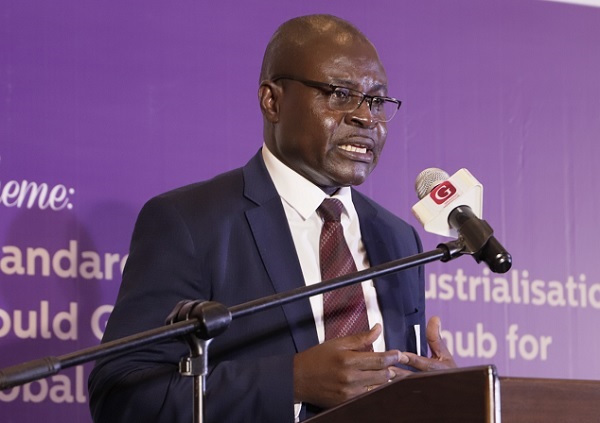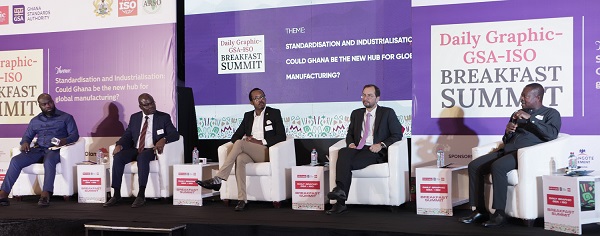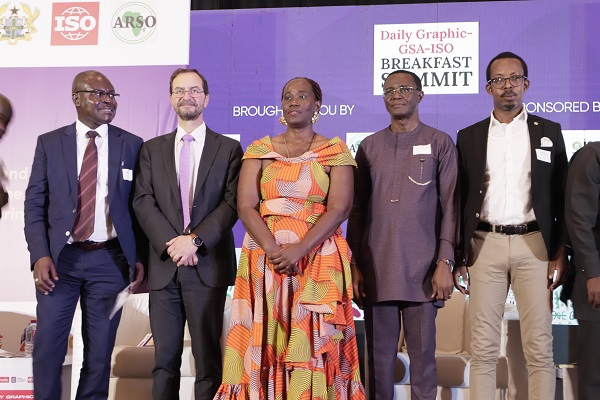
Country set for industrial hub: Infrastructure ready - Prof Dodoo
The Director-General of the Ghana Standards Authority (GSA), Professor Alex Dodoo, has called for stronger coordination on the part of all ministries and regulatory bodies to work harder and make the country a new manufacturing hub.
He explained that the approval of the National Quality Policy (NQP) and passage of the Standards Authority Act, 2022 (Act 1076) were crucial interventions that would prepare local companies and send the right signals to the rest of the world that the country was open for large-scale investments in the production sector.
“We have been able to develop the companies, human resource, standards and NQP; what we need now is coordination for the new industrialisation hub to happen.
“So yes, Ghana will become the unequivocal next hub of global manufacturing because we have the ingredients and infrastructure to support the agenda,” Prof. Dodoo said.
At the maiden Daily Graphic-GSA-ISO Breakfast Summit in Accra last Friday, the Director-General of GSA maintained that the country had also taken deliberate steps to develop manufacturers (industries), human resources and standards to support the industrialisation drive.
Those constituted the necessary infrastructure and conditions to become the new industrialisation hub of the world, Prof. Dodoo stated.
The summit

The summit, an initiative of the Graphic Communications Group Limited (GCGL) and GSA, with support from the International Standardisation Organisation (ISO), is a series of dialogues that will feature selected topics aimed at influencing government policies in favour of industries.
It is also to drum home the need for industries, especially small and medium-sized enterprises, to embrace and deploy standards in their operations in order to break regional and international barriers to trade.
The breakfast summit brought together players in the private sector, particularly manufacturing concerns, policymakers, regulators and academia to discuss the country’s potential of becoming a global manufacturing hub.
It was on the theme: “Standardisation and industrialisation: Could Ghana be the new hub for global manufacturing?”
Prof. Dodoo referred to history and pointed out that when a nation showed strong determination and put efforts in place, it would succeed on its industrialisation drive.
“Other countries have done it before; China and India are recent examples,” the Director-General said.
Prof. Dodoo said the country needed to industrialise to create jobs for its citizens as part of measures to curb its rising unemployment.
He said the Directive Principles of State Policy of the 1992 Constitution directed that the state must take all necessary actions to ensure that the national economy was managed in a manner that maximised the rate of economic development.
That, he said, was to secure the maximum welfare, freedom and happiness of every person in Ghana and to provide adequate means of livelihood and sustainable employment.
“We already have a young, energetic and hungry-for-success generation trained from our newly rejuvenated technical and vocational education and training (TVET) institutions”.
“We also have solid manufacturing firms led by their umbrella body, the Association of Ghana Industries (AGI),” Prof. Dodoo added.
Optimism
The Commissioner-General of the Ghana Revenue Authority (GRA), Rev. Dr Ammishaddai Owusu-Amoah, who was the chairperson of the summit, challenged Ghanaians to take steps that would ensure that the country became the new global manufacturing hub.
He said there should be a consensus on measures to build capacity and to be equipped enough for the rest of the world to acknowledge that indeed the country was open for industrialisation.
“And so, as an optimist and a true Ghanaian, I will set the tone for this discussion on the premise that we must become the hub of global manufacturing and industrialisation,” Rev. Dr Owusu-Amoah said.
Appropriate value
The GRA Commissioner-General stated that a country with so many natural resources was required to set the standard and be able to transform from exporting raw materials to semi-finished and finished goods to the international market.
That, Rev. Dr Owusu-Amoah said, would ensure that the country was able to get the appropriate value from its natural resources.
He said industrialisation was crucial to ensure that investors were more certain of the operating space and the mechanisms and standards required.
“When there is a consensus in standardisation, the products or services that are being delivered or manufactured are always fit for purpose due to the confidence,” the Commissioner-General added.

Prof. Alex Dodoo (left), Director-General, Ghana Standards Authority, chatting with Sergio Mujica (2nd from left), Secretary General of the International Organisation for Standardisation. Looking on are Patricia Safo (3rd from left), CEO of JCS Investments Limited; Rev. Dr Ammishaddai Owusu-Amoah (4th from left), Commissioner-General, Ghana Revenue Authority, and Dr Hermogene Nsengimana, Secretary General, African Organisation for Standardisaction. Picture: EDNA SALVO-KOTEY.
Industry’s view
The Chief Executive Officer (CEO) of AGI, Seth Twum Akwaboah, entreated the government to support indigenous industries to grow and become global giants.
He stated that a deliberate effort towards building the capacities and helping industries to conform to standardisation would enable them to compete favourably on the international market.
That, he said, was equally necessary to send the right signals to the rest of the world that the country was ready to become the next hub of global manufacturing.
Mr Akwaboah stated that deliberate support was crucial because the majority of indigenous industries were SMEs.
“We must admit that the majority of our manufacturers and industries are operating in the SMEs space”.
“I will say some of the SMEs are doing well, most of them are getting ready and others need to be supported to get ready and so we cannot say we are fully ready to be the new hub of manufacturing in the world,” the AGI CEO said.
Mr Akwaboah explained that there were many countries in Africa that had been doing extremely well in manufacturing and Ghana was among them.
He said a number of global industrial giants and brands such as Guinness, Unilever, Nestle and Wilmar had operations in the country.
“However, we have few of our indigenous industries that have attained such levels as well, including Tropical Cable and Conductor Ltd, Kasapreko and some pharmaceutical companies”.
“These indigenous industries have attained the latest versions of ISO certification and so I can comfortably indicate that they are effectively meeting the standards”.
“With that, they are already global, their products can go anywhere in the world without any problems but the majority of the indigenous industries fall within the SME space and more needs to be done to get them to embrace conformity,” Mr Akwaboah added.
Leverage standards
The Secretary-General of the African Organisation for Standardisation (ARSO), Dr Hermogene Nsengimana, challenged Ghanaians to leverage standards to boost industrialisation in the country.
He said the country and its manufacturers must build knowledge on standards because they were the cheapest way of acquiring skills required for industrialisation.
“We must also take value addition seriously because it is a component embedded in standardisation”.
“Standards inspire healthy competition among manufacturers and producers and also bring out the best of innovation,” Dr Nsengimana said.
Universal global standards
For his part, the Secretary-General of ISO, Sergio Mujica, stated that international standards were more important and relevant in today’s changing world.
He maintained that for the African Continental Free Trade Area (AfCFTA) to become successful, universal global standards that could be recognised and valued by all must be applied.
“We want one standard, one test and one certification recognised and accepted everywhere. So with standards, you can have global access in your organisations for your products,” Mr Mujica, who was on a three-day official visit to the country, said.